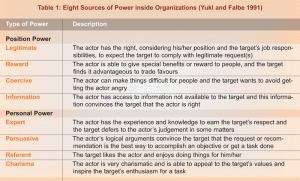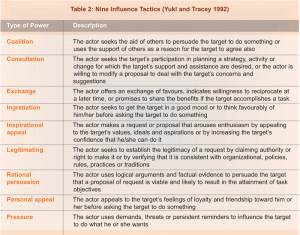
CSR literature indicates that an increase in power associated with CSR is positive, particularly for stakeholders. Dr. Krista Bondy, CSR Lecturer at the University of Bath?s School of Management, conducted extensive research on power and CSR within a single in-depth case study. She found that in practice, power can actually lead to conflict within organizations, resulting in CSR activities being virtually ignored.
Results
Some actors use CSR to improve their own positions within an organization at the expense of CSR activity. Resource dependence theory is used to highlight why this may be a more significant concern for CSR than for other disciplines.
Conclusions
Those fighting for control over CSR often do so at the expense of CSR development and implementation efforts. The increasing power of CSR can act as an impediment by attracting individuals who are more interested in increasing their own power than in furthering effective CSR strategy. This struggle is intensified because of the strong link between organizational and personal ethics unique to CSR.
In this Research Paper Summary, tbl presents the conclusions from a paper illustrating a simple but significant point: based on previous CSR research, we would expect that an increase in the power associated with CSR results in positive benefits for a range of stakeholders. In practice this is not always the case. In fact in some organizations, the more powerful CSR becomes, the more this power becomes an obstacle to implementing CSR systems, processes and initiatives that generate stakeholder benefits. Therefore, an increase in power of CSR can be either of no benefit, or negatively impact the vast majority of stakeholders when this power causes stagnation in its development and implementation.
This stagnation results from a process whereby the power associated with CSR increases, causing the potential power of individuals with CSR responsibilities inside organizations to also increase. Some managers recognize the potential for using CSR to improve their own power position, and may have little interest in promoting and developing CSR within the organization. This causes a power struggle between actors who attempt to control CSR in different ways to improve their own power within the organization. This struggle can undermine development and implementation efforts, as attentions and priorities of managers are turned away from CSR activity.
Unlike other management areas such as quality control, profit maximization or marketing, this problem is unique to CSR. Due to the fact that power is thought to have a positive effect on CSR resulting in higher levels of organizational activity on CSR issues, and the emphasis on ?doing the right thing?, we would expect that CSR is less susceptible to power relations than other business imperatives. Paradoxically, this case illustrates that both of these assumptions do not always hold true in practice. Resulting from the link between CSR and the personal ethics of those responsible for it, the power struggle may in fact be more intense than other business imperatives and therefore needs to be carefully managed.
Tools for observing the use of power within organizations
Managers that recognize the increase in power associated with CSR have a number of tactics at their disposal to strengthen their association and control over the direction of CSR within the organization. Work on power bases (e.g. French and Raven 1959; Yukl and Falbe 1991), and influence tactics (e.g. Kipnis, Schmidt and Wilkinson 1980; Yukl and Tracey 1992) are useful in analyzing the behaviour of individuals within an organizational setting to show where they believe their power comes from (what power sources they refer o) and what tactics they are using to change the level of power they already have within the organization (power change and use tactics). Therefore, the two tools represented in Tables 1 and 2 can be used to identify how some managers are using the opportunities associated with an increase in power of CSR to realize the rewards of dealing with related uncertainties and resource acquisition.
Conclusion
The research paper suggests that there is a paradox of power in CSR. The positive benefits to stake-holders associated with increased power of CSR do not in fact exist in some circumstances. In fact, an increase in the power of CSR may be an impediment to its effective development and implementation in some organizations. Thus, this increase in power may lead to opportunistic behaviour, which may result in the subversion of CSR and its benefits for stakeholders. CSR is particularly susceptible to opportunism because of the high degree of uncertainty surrounding CSR, the lack of awareness about the degree of opportunism within organizations surrounding CSR and the resulting difficulties in identifying appropriate resources for responding to both CSR and relevant opportunism.
The research therefore has three implications for organizations: one, CSR can result in opportunities for individual actors to improve their own positions within an organization; two, those fighting for power often do so at the expense of CSR development and implementation efforts; and three, the increasing importance of CSR for business may be an impediment in that it increasingly attracts individuals who are more interested in increasing their own power rather than developing and implementing effective CSR strategy. As such, managers must be aware of and mitigate potential conflicts resulting from a competition for power surrounding control of CSR, or risk reputational damage associated with making CSR commitments but not following through on them.
The research analysis demonstrated the significant influence power can have over CSR development and implementation, highlighting the paradoxical power of CSR and thus the need for further research into the link between CSR, power and implementation.







